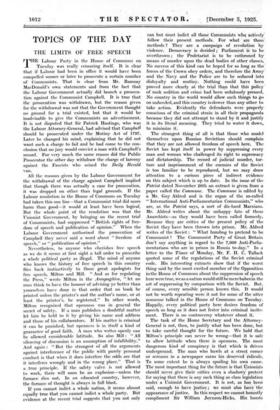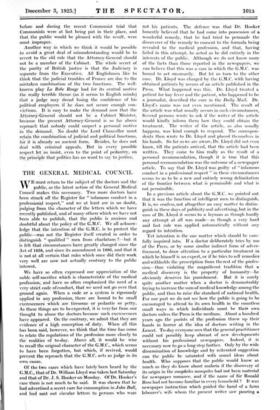TOPICS OF THE DAY
THE LIMITS OF FREE SPEECH
THE Labour Party in the House of Commons on Tuesday was really censuring itself. It is clear that if Labour had been in office it would have been compelled sooner or later to prosecute a certain number of Communists. That is clear from Mr. Ramsay MacDonald's own statements and from the fact that' the Labour Government actually did launch a prosecu- tion against the Communist Campbell. It is true that the prosecution was withdrawn, but the reason given for the withdrawal was not that the Government thought no ground for a trial existed, but that it would be inadvisable to give the Communists an advertisement. It is not disputed that Sir Patrick Hastings, who was the Labour Attorney-General, had advised that Campbell should be prosecuted under the Mutiny Act of 1797. Later he changed his mind, explaining that he did not want such a charge to fail and he had come to the con- clusion that no jury would convict a man with Campbell's record. For very much the same reason did the Public Prosecutor the other day withdraw the charge of larceny against the Fascists who seized the Daily Herald van.
All the reasons given by the Labour Government for the withdrawal of the charge against Campbell implied that though there was actually a case for prosecution, it was dropped on other than legal grounds. If the Labour resolution in the House of Commons on Tuesday had taken this one line—that a Communist trial did more harm than good—it would at least have been logical. But the whole point, of the resolution was that the Unionist Government, by bringing on the recent trial of Communists, had suppressed " British rights of free- dom of speech and publication of opinion." When the Labour Government authorized the prosecution of Campbell they never said a word about " freedom of speech," or " publication of opinion."
Nevertheless, to anyone who cherishes free speech as we do it seems at first sight a' tall order to proscribe a whole political party as illegal. The mind of anyone who knows the history of free speech in this country flies back instinctively to those great apologists for free speech, Milton and Mill. " And as for regulating the Press," wrote Milton in the Areopagitica, " let no Man think to have the honour of advising ye better thin yourselves have done in that order that no book be printed unless the printer's and the author's name, or at least the printer's, be registered." In other words, Milton recognized that openness was in general the secret of safety. If a man publishes a doubtful matter let him be held to it by giving his name and address and those of his collaborators. If his matter is criminal it can be punished, but openness is in itself a kind of guarantee of good faith. A man who writes openly can be allowed considerable latitude. So also Mill : " All silencing of discussion is an assumption of infallibility." And again : " But the strongest of all the arguments against interference of the public with purely personal conduct is that when it does interfere the odds are that it interferes wrongly and in the wrong place." That is a true principle. If .the safety valve is not allowed to work, there will soon be an explosion—unless the furnace dies out. In an educated country, however, the furnace of thought is always ,in full blast. n If you cannot indict a whole nation, it seems almost equally true that you cannot indict a whole party. BUt evidence at the recent trial suggests that you not only can but must indict all those Corbmimists whq actively' follow their present methods. For what are those' methods ? They are a campaign of revolution by violence. Democracy is derided ; Parliament is to be overthrown ; the Proletariat is to be enthroned by means of murder upon the dead bodies of other classes.: No success of this kind can be hoped for so long as the' forces of the Crown obey orders, and therefore the Army' and the Navy and the Police are to be seduced into' disloyalty and mutiny. Nothing could hive been proved more clearly at the trial than that this policy of rank sedition and crime had been sedulously pressed. No country in the world would allow such things to go on unheeded, and this country is slower than any other to take action. Evidently the defendants were properly • conscious of the criminal strain in all their propaganda because they did not attempt to stand by it and justify it in its literal meaning. They tried to water it down, to minimize it.
The strangest thing of all is that those who model themselves upon Russian Sovietism should complain that they are not allowed freedom of speech here. The Soviet has kept itself in power by suppressing every man and woman who challenged its right to supremacy and dictatorship. The record of judicial murder, tor- ture and imprisonment of the enemies of the Soviet is too familiar to be reproduced, but we may draw attention to a curious piece of indirect evidence on this subject which is up to date. In the issue of the Patriot dated November 26th an extract is given from paper called the Commune. The Commune is edited by a Mr. Guy Aldred and is the organ of the so-called " International Anti-Parliamentarian Communists," who are, as the Patriot says, a sort of die-hard Marxians. Mr. Aldred writes about the unhappy fate of these Anarchists—as they would have been called formerly. Because they are critics of the present policy of the Soviet they have been thrown into prison. Mr. Aldred writes of the Soviet : " What humbug to pretend to be Communist ! The Communist Party of Great Britain don't say anything in regard to the 7,000 Anti-Parlia- mentarians who are in prison in Russia to-day." In a letter to the Times of Monday, Mr. F. H. C. Tallack quoted some of the regulations of the Soviet criminal code. His interesting extracts show that if the worst thing said by the most excited member of the Opposition in the House of Commons about the suppression of speech here were true, we as a nation would still be mere babes in the art of suppressing by comparison with the Soviet. But, of course, every sensible person knows this. It would not be worth repeating were it not for some of the utter nonsense talked in the House of Commons on Tuesday. Happily, every political party here desires freedom of speech so long as it does not fester into criminal incite- ment. There is no controversy whatever about it.
The task of the Home Secretary and the Attorney- General is not, then, to justify what has been done, but to take careful thought for the future. We hOld that Milton's principle can never be wrong—that it is safe to allow latitude when there is openness. The most dangerous kind of conspiracy- is that which is driven underground. The man who bawls at a street corner or screams in a newspaper earns his deserved ridicule, To some extent he is always spoiling his own cause. The most important thing for the future is that Unionists should never:give their critics even a shadowy pretext for saying that there is any such thing as class legislition under a Unionist Government. It is not, as has been said, enough to have justice ; we must also have the appearance of justice. In this respect we cannot honestly compliment Sir William Joynson-Hicks. His boasts before and during the recent- Communist trial that Communists were at last being put in their place, and that. the public would be pleased with the result, were most improper.
Another way in which we think it would be possible to avoid a great deal of misunderstanding would be to revert to the old rule that the Attorney-General should not be a member of the Cabinet. The whole secret of the purity of British justice is that the Judiciary is separate from the Executive. All Englishmen like to think that the judicial troubles of France are due to the mistaken combination of the two functions. The well- known play La Robe Rouge had for its central motive the really terrible theme (as it seems to English minds) that a judge may dread losing the confidence of his political employers if he does not secure enough con- victions. It is easy to make the tleMand now that the Attoiney-Oeneral should not be a Cabinet Minister, because the present Attorney-General is so far above reproach that nobody could suspect a personal motive in the demand. No doubt the Lord Chancellor must retain the combination of judicial and political functions, for it is already an ancient form. Besides, he does not deal with criminal appeals. But in every possible respect Jet 'us insist, even to the point of pedantry, on the principle that politics has no word to say to justice.



































































 Previous page
Previous page